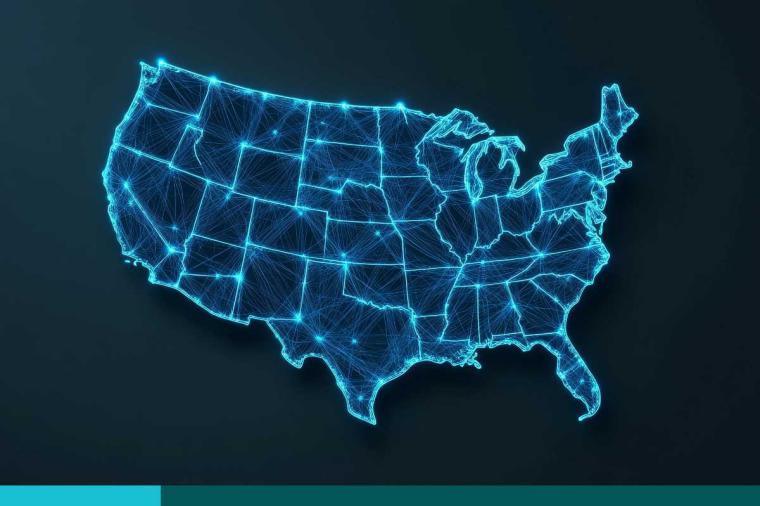ICYMI: NASCIO’s Midyear Conference Rundown

The 2024 National Association of State Chief Information Officers (NASCIO) Midyear Conference took place in National Harbor, Maryland last week where state leaders shared insights into their top technology priorities, challenges, and lessons learned. Some of the key focus areas included artificial intelligence (AI) with emphasis on generative AI, data management, accessibility, and governance, cybersecurity and risk management, and modernization and the digital customer experience.
Artificial Intelligence
It probably comes as no surprise that artificial intelligence was a hot topic throughout the conference, as it continues to be all the rage nationwide. AI made NASCIO’s top ten technology priorities list this year, making the list for the first time in NASCIO history, signifying the current and future role that emerging technologies such as AI are playing in the state, local & education (SLED) technology space. Whether it’s public administration, public health, or education, AI is influencing government operations across all verticals. Through its various applications such as natural language processing, task automation, image recognition, and smarter policymaking, AI can shift how state and local governments interact with their constituencies and carry out day-to-day tasks.
When it comes to generative AI, quite a few states are at a relatively similar maturity spot. For state chief information officers (CIOs), there is emphasis on establishing the appropriate policies and frameworks, studying potential implications through use cases, and creating a culture of open and honest discussion amongst stakeholders. Considerations around risk evaluation, procurements and contracts, workforce, and equity and accessibility are also top of mind.
States are still in the inception phase of generative AI use and implementation, with heavy prioritization on the development of a proper governance framework, and the opportunity to test generative AI’s capabilities through various use cases.
The state of Massachusetts, for example, has developed an AI roadmap, along with a use case inventory that can provide a safe place for AI use cases to be developed. The state is also fleshing out a robust governance process and has issued AI-related directives to the executive branch. Furthermore, the state has recruited students from higher education institutions within Massachusetts such as Northeastern University, to be involved in the AI testing process with various use cases.
The state of Connecticut has created what they call an AI ‘model card’, which is essentially a nutrition label for technology that gives users an understanding of what they are actually consuming. The card contains information such as developer and model version, intended use, evaluation data, training data, and ethical considerations.
State leaders acknowledged the state of hopefulness towards generative AI’s adoption and use, while recognizing the need to be cautious and understanding that AI is not a panacea for all. AI has the potential to drive innovation and progress for SLED entities, and this will be reflected in future procurements and acquisitions.
IT companies should continue to stay abreast of developing regulations and policies governing AI and its usage, with the understanding that security, privacy, equity and accessibility, and data governance will be top priority. For IT companies in the security and/or privacy space, state and local government customers will be looking to bake in stringent security and privacy measures throughout all layers of AI’s execution. This “secure by design” approach will require the protection of all AI systems and critical infrastructure from cyber threats. Secure and resilient AI software development and implementation will require software vulnerabilities to be addressed, and AI manufacturers will need to prioritize security throughout the product’s entire lifecycle.
Data Management, Accessibility, and Governance
In a soon-to-be-released survey from NASCIO and Ernst & Young LLP (EY) on data management, 96 percent of survey respondents stated that the increased adoption of generative AI is driving the need for better data management. The rapid advancement and adoption of generative AI has posed concerns about data management and data quality, and many state leaders agree that data management efforts need to quickly meet the data standards required by emerging technologies such as AI.
When it comes to open data and data visualization, Washington, DC is on a mission to make accessing, identifying, and using open data a more seamless resident experience. DC’s open data platform began in the 90s to promote government transparency and empower the public. The platform allows anyone to explore the available data and generate new insights. However, in keeping with the movement to enhance the customer experience, DC recognized that despite data availability, users may still find difficulties in navigating the platform, and identifying specific city initiatives. To combat some of these challenges they created DC Compass, which uses generative AI and geospatial analysis on an open data platform. There is an AI assistant that allows for text or voice interaction and language translation where users can ask questions about open data.
Many states recognize the integral role of data quality, management, and accessibility in everyday operations. Show your customer how easy it is to integrate your solution within their existing data infrastructure; how compatible it is. To tackle challenges around data management and data quality, use this opportunity in the near-term to partner with state and local agencies to alleviate some of their concerns and allowing them to become more innovative in future adoption of emerging technologies.
Cybersecurity and Risk Management
Unsurprisingly, cybersecurity is still top of mind for state CIOs, and will continue to drive purchasing decisions for state and local government end users. Cybersecurity threats continue to pose risk to our nation’s infrastructure and bad actors are only becoming more sophisticated as their access to resources such as artificial Intelligence becomes easier.
Cybersecurity is still requiring an all-hands-on-deck, whole-of-state approach involving interagency collaboration and governed under a secure framework such as Zero Trust. Security tools such as multi-factor authentication (MFA), endpoint detection, and vendor risk management solutions are key.
Phishing incidents are on the rise, and to support state efforts to combat these incidents, state leaders are hoping to see phishing-resistant MFA pushed at the federal level. Action by the federal government would help to provide support and guidance to SLED entities.
Another topic of concern was vendor risk management and having the proper incident response plans intact. Some states, like Texas, have required by law certain risk management procedures and controls related to external vendor risk management. Others establish policies and procedures outside of state mandates that can achieve the same outcome. When it comes to cloud security, StateRAMP and FedRAMP certifications are favorable.
Some of the high priority cybersecurity areas include elections, healthcare, education, and water management facilities. New Hampshire, for example, highlighted critical infrastructure as its top security concern statewide as security threats and attacks that target this sector can have grave implications for residents should for example, access to water or electricity be compromised.
As we continue into FY25, technology companies will continue to see demand for tools and solutions that can help shore up their cybersecurity posture such as software and firewall protections, securing a reliable backup system, cyber training for staff and testing for vulnerabilities, systemwide multi-factor authentication, continuous security monitoring, encryption, and cloud backup processes. State leaders also cautioned against pitching tools or solutions without disclosing information about the origin of their data.
Modernization and the Digital Customer Experience
Enhancing the Customer Experience will continue to be a top priority both now and, in the future, as today’s world emphasizes the importance of personalized services that provide agility, accountability, transparency, equity, efficiency, and adaptability. When it comes to community trust in administrative decision making, there is a strong desire for transparency and accountability. Digital services help support transparency and allow people to feel a stronger sense of involvement with their local government agencies.
There is emphasis on making identity work for everyone. For instance, there may be 10-15% of individuals in a state that do not hold a driver’s license and there needs to be consideration in how to address these gaps with a one-off solution. To combat some of challenges related to accessibility, the state of Georgia created a pilot program whereby a DMV kiosk was placed at a local Kroger grocery store, allowing residents to shop for food and renew their vehicle registration in one fell swoop.
States are becoming increasingly more innovative in their approach to technology adoption, and there is no doubt that modernization and digitization efforts centered around the citizen experience are influencing acquisitions across all SLED entities. You will want to tailor messaging around how your solution can complement these efforts and take into account each state’s unique pain points and challenges. Be prepared to discuss the benefits around how your solution can streamline service delivery, provide real-time insights, bolster security and privacy, bridge gaps in equity and accessibility, and support their goal to emerge as an innovative leader in the citizen experience.
To get more TD SYNNEX Public Sector Market Insight content, please visit our Market Intelligence microsite.
About the Author:
Yvonne Maffia is the senior analyst covering state, local and education markets. She applies insights and analysis to purchasing trends to help vendors and partners shorten their sales cycles. Prior to joining TD SYNNEX Public Sector, Yvonne spent 8 years working in state and local government, where she oversaw advisory boards across the State of Florida and served as an analyst to a local politician. Yvonne currently lives in Washington, DC.


































